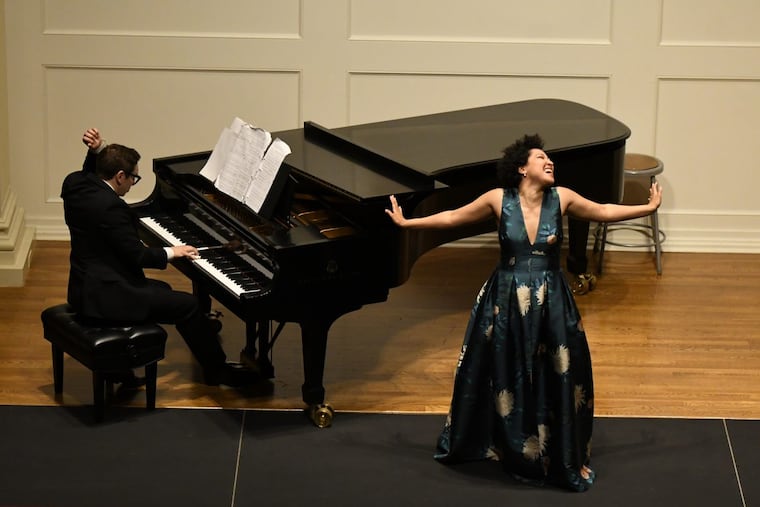Soprano Julia Bullock and pianist John Arida and the art of the big personality
The pair performed Schubert and Nina Simone in the last Philadelphia Chamber Music Society concert of the season.

Julia Bullock calls herself a soprano, and this much is true. But never has a label seemed as inadequate as it did Tuesday night in Bullock's recital with pianist John Arida at the American Philosophical Society. It wasn't just that her vocal range runs low and strong, or even that her material was expansive — Schubert and Barber, as well as songs by Nina Simone and Billie Holiday.
What rendered useless any single label was the blending of singing and acting into a performing sum that is unique. Bullock has enormous personality. But which one?
Truth be told, in this last Philadelphia Chamber Music Society concert of the season, she sounded more engaged in some material than others. Four songs by Schubert were lovely enough. She handled the ambivalent mood with a crystalline sound in Suleika I, D. 720. A super-quiet moment in Wanderers Nachtlied II, D. 768 tested her control.
But Fauré seemed to mean so much more to her. In excerpts from his song cycle La chanson d'Ève, Op. 95, she took on drama of operatic proportions, changing her sound to the emotion of the lyrics, and doing so with enormous insight.
Bullock is an intense experience. In "Prima verba" from the Fauré, when the text speaks of how the soul of the fountains and woods seeps into the sounds of the voice, she responded with a deep resonance and sheen. In the next song in the cycle, "Ardent Roses," her voice stepped into the sunlight. Arida provided the bees in "Are you watching, my scent of sun?" in a busy piano part that indeed seemed to levitate.
Deep emotional connections phased in and out in Barber's Hermit Songs, though here Arida was the great source illuminating text. This has much to do with Barber's piano writing, of course, but Arida's touch was just right — his hybrid of bells tolling amid great labors in "At St. Patrick's Purgatory," the tenderly rocking improvisatory feel in "St. Ita's Vision," the ease of co-existence in "The Monk and his Cat."
Bullock enlisted the arranging help of composer-pianist Jeremy Siskind for a string of works composed or co-composed by musicians generally better known as singers. Bullock was warm and lovely in Billie Holiday's "Our Love is Different," making no attempt, thankfully, to emulate the singular Holiday sound.
She took an even greater risk in Nina Simone's "Revolution," from 1969. Here Siskind added a percussion section to the piano; Arida prepared his instrument by reaching into its body and putting certain strings in contact with what Bullock said was putty and pins. The effect was startling and wonderful. Not a lot of singers would be able to fuse the controlled sound of classical training with the more unhinged stylistic needs of a tune like "Revolution." Bullock did it — powerfully, nobly and, most remarkably, by sounding like no one but herself.